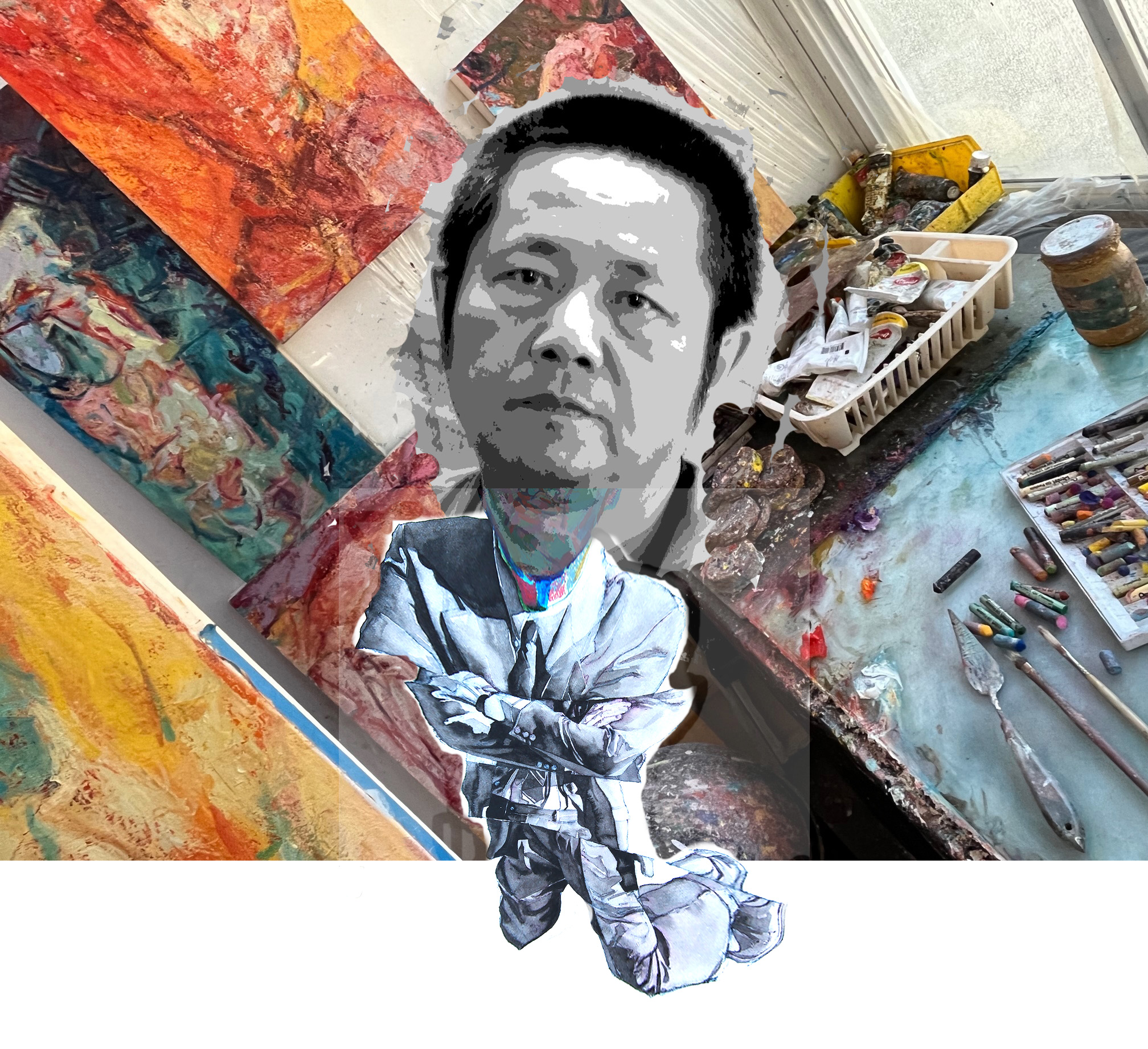Mr. Yi Kai is an internationally renowned Chinese-American artist whose artistic career spans over half a century, showcasing a rich and diverse creative journey.
His journey of art can be divided into two phases. The first phase began in China, where he self taught art starting at the age of 15. In 1979, he was admitted to the PLA Academy of Art in Beijing, and during his sophomore year, two of his works won bronze medals at the National Art Exhibition. In 1981, he joined the China Artists Association, and in 1983, he received his bachelor’s degree and stayed on as a faculty member. In 1988, he earned his master’s degree in oil painting from the Minzu University of China (MUC). The following year, he was specially invited by Ping Xintao and Qiong Yao to hold a solo exhibition at the Crown Art Center in Taipei.
In 1990, Yi Kai moved to the United States, marking the beginning of the second phase of his professional art career. During his 34 years in the U.S., Yi Kai held exhibitions at the Minneapolis Institute of Art (MIA), one of the top ten art museums in the country, and his works were collected by the museum. He has held over 40 solo and group exhibitions worldwide, and his works are housed in museums and institutions across the United States, Japan, Europe, and Asia.
In 2011, Yi Kai was featured in the publication Green Card Stories, which honors and documents the achievements of 50 outstanding American immigrants over the 50 years following World War II. Yi Kai’s accomplishments not only enriched the forms of artistic expression but also expanded the social functions of art, building a vital bridge for cross-cultural dialogue and understanding.
Yi Kai has achieved mastery in various techniques, including traditional Chinese painting, oil painting, calligraphy, and printmaking, perfectly blending Chinese traditional culture with Western art. His works not only demonstrate superb craftsmanship but also embody profound reflections on the societal and human conditions.
Stewart Turnquist, curator at the Minneapolis Institute of Art, remarked in 1999: “His paintings not only explore the fusion of Chinese and American cultures but also point the way for us to enter the next century.”
Special Collections
- Pomona College, Claremont, CA
- University St Thomas, St Paul, MN
- Hearts On Fire, Boston, MA
- Warwick Hotel, Paris, France
- The Minneapolis Institute of Art, MN
- Medtronic, Minneapolis, MN
- Key Investment, Minneapolis, MN
- Hang Seng Bank, Hong Kong
- SAP American, Philadelphia, PA
- LeeFon Corporation, Singapore
- The Woman’s Club of Minneapolis, MN
- Dorsey & Whitney, Hong Kong Office
- Minnesota Museum of American Arts, Minneapolis, MN
- Dolly Fiterman Fine Arts, Minneapolis, MN
- Piper Jaffray, Minneapolis, MN
- The St Paul Company, Minneapolis, MN
- China Times Newspaper, Taipei, China
- Museum of Fu Tan Po, Osaka, Japan
- Beijing Art Institute, China
Group Exhibitions
- 2021 Featured Artist, Itsliquid, Italy
- 2021 Chan Gallery, Pomona College, Claremont, CA
- 2020 Artist of the Month, Itsliquid, Italy
- 2018 Art Museum of Tianjin Academy of Fine Art, P.R of China
- Three man show in Alisan Fine Arts, Hong Kong
- 2015 Alisan Fine Arts 35 years group show, Hong Kong
- 2012 Los Angeles International Art Expo, Los Angeles, CA
- San Francisco International Art Expo, San Francisco, CA
- George Cuttress Fine Arts, CA
- University of St Thomas Gallery, Minneapolis, MN
- 2011 Faster Gallery, University of Wisconsin, WI
- CCAA Museum of Art, Rancho Cucamonga, CA
- Koehler Gallery, CA
- 2010 OCCOA Gallery, Orange County, CA
- 2007 Brand 36 works on paper, Glendale, CA
- 2005 Powers Gallery, Acton, MA
- 2004 Powers Gallery, Acton, MA
- 2003 New American Drawing 2003”, Santa Fe, NM
- 2002 Plains Art Museum, Fargo, ND
Solo Exhitions
- 2020 The Progress Gallery, CA
- 2015 Claremont Graduate University Gallery, Claremont, CA
- 53 Art Museum, Guangzhou, China
- Alisan Fine Arts, Hong Kong
- 2014 Museum of Art and History, Lancaster, CA
- 2004 DeCordova Museum of Arts, Lincoln, MA
- 2003 Gallery Lasietique, Scottsdale, AZ
- 2000 Alison Fine Arts, Hong Kong
- Museum West Fine Arts, San Francisco & Palo Alto, CA
- 1999 Dolly Fiterman Fine Arts, Minneapolis, MN
- 1998 Museum West Fine Arts, San Francisco, CA
- 1998 Dai Ichi Fine Arts, New York
- Alisan Fine Arts, Hong Kong
- 1997 Nelson/ Rovzar Gallery, Seattle, WA
- Orchard Point Exhibition Hall, Singapore
- 1996 Nelson/ Rovzar Gallery, Seattle, WA
- 1991 Asian Fine Arts, Minneapolis, MN
- 1990 Larson Gallery, University of Minnesota, MN
- 1989 Crown Art Gallery, Taipei, Taiwan
- 1988 National Art Museum of the Peoples Republic of China, Beijing
Awards
- 2020 Artist of the Month, Itsliquid, Italy
- 2002 Best of the Show, 6th International Art Competition, Estes Park, CO
- 2000 Work included in lecture by Elizabeth Brown, Director of National Museum of American Art,
- 1996 Curator’s Choice, Auction, Minneapolis College of Art and Design, Minneapolis, MN
- 1985 Award of Excellence, Beijing Art Exhibition, Beijing, China
- 1981 Two Bronze Medals, National Art Exhibition of China, Beijing, China
Publications
- 2015 What Goes Around Goes Around Yi Kai’s (catalogue)
- 2013 Impression of US (catalogue)
- 2005 Impression Ink Drawing of Tibet (catalogue)
- 2001 5 paintings were published by Grand Image and distributed by Bruce McGraw, New York,
- 2001 Time, Yin & Yang (catalogue), Alison Fine Arts, Hong Kong
- New Paintings by Yi Kai (catalogue), Museum West Fine Arts, CA, USA
- 1999 A Decade of paintings by Yi Kai (catalogue), Dolly Fiterman Fine Arts, Minneapolis, MN
- 1997 Painting Album of Yi Kai ( catalogue) Dynasties Art Gallery, Singapore Collection
- 1989 Painting of Yi Kai ( catalogue) Crown Art, Taipei
Teaching
- 2017 – 2020 Working as faculty member in Claremont Graduate University, CA
- 1988 – 1990 Associate Professor, Central University of Nationalities, Beijing, China
- 1983 – 1985 Assistant Professor, Art Institute of the People’s Liberation Army, Beijing, China
- 2021 Chan Gallery, Pomona College, Claremont, CA
- 2019 Guangzhou Academy of Fine Arts, China
- 2018 Tianjin Academy of Fine Art, P.R of China
- 2016 Claremont Graduate University, CA
- 2015 53 Art Museum, Guangzhou, China,
- Alisan Fine Arts, Hong Kong
- 2017 Art lecture tour in 4 colleges in China
- 2014 Art lecture tour in 6 colleges in China
- 2013 Art lecture tour in 9 colleges in China
- 2010 University of Santa Barbara, CA
- 2008 University of Minnesota, MN
- 2002 University of St Thomas, Minneapolis, MN
- 1997 University of Singapore, Singapore
- 1991 University of Minnesota, St Paul, MN

